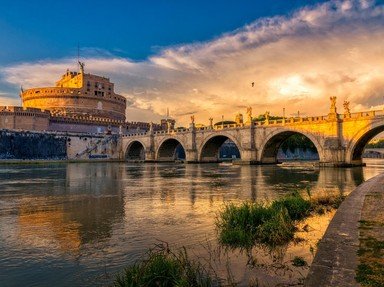Quiz Answer Key and Fun Facts
1. I am standing on the banks of the river the ancient Romans originally called Albulula. What is it called today?
2. At one point, the Cloaca Maxima connects to the main river in Rome. What does "Cloaca Maxima" mean?
3. We have stopped at a church called Santa Maria dei Martiri (Church of St. Mary and the Martyrs) to give thanks for a safe journey to Rome. The ancients used this building as a temple to all of the gods. What did they call the building?
4. In finding our way through the ancient Roman Forum, we discovered the origin of one of the oldest Roman roads. The ancient Roman, Statius, called it "the queen of the long roads." What was this road called that ran from Rome to Brindisi?
5. We are at the site of the Amphitheatrum Flavium, where ancient Romans saw gladiator fights, animal fights, and mock naval battles. Which emperor began the construction of this great Colosseum?
6. I am so disappointed. We are at the site of the ancient Circus Maximus, and it doesn't look the way I expected it to look. I was hoping that it was still maintained the way it was in ancient times. Chariot races were the only event held there.
7. One of the greatest tragedies in Roman history took place at the building called the Curia. I was humbled to view the spot in this building where the greatest Roman of them all died. Whose assassination took place here?
8. After traveling such a great distance, my party and I were relieved to find this building from ancient Rome still open. It contains a "natatio", "frigidarium", and a "caldarium". Where are we?
9. My lord, the Earl of Warwick, doesn't want to leave Rome until we all visit the "La Bocca della Verit�". Apparently he wants us to answer questions about some of our antics while we have been visiting the city. There is an image engraved in stone; where will he ask us to place our hands while he asks us questions?
10. Our journey is about to end, but the Earl still has a meeting with the pope at the basilica in Rome. This basilica was originally built by the Emperor Constantine, although it has been expanded and changed over the years. According to legend, who was buried beneath the altar?
Source: Author
ponycargirl
This quiz was reviewed by FunTrivia editor
bloomsby before going online.
Any errors found in FunTrivia content are routinely corrected through our feedback system.

